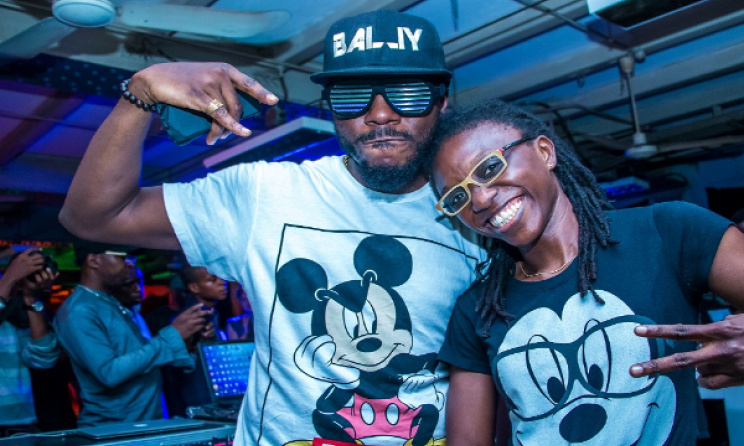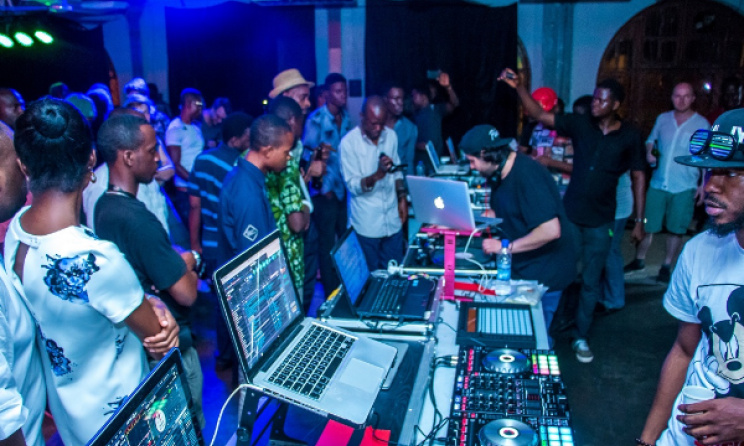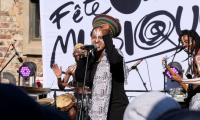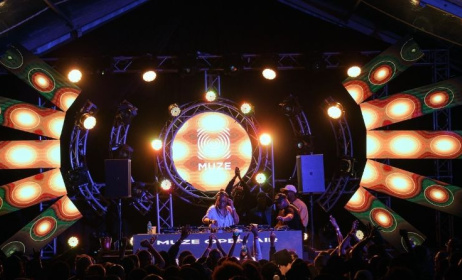Concert moves electronic music forward in Lagos
In the last decade, electronic music has seen a rise in sales and increased acceptance worldwide. Perhaps EDM’s increased visibility at the Grammys signalled a revolution. In South Africa, house music, a derivation of electronic music characterised by synthesised beats and repetitive vocals, is well accepted so much that the country has produced an indigenous form. That revolution, however, is yet to visit Nigeria, where pop, local and American style, succeeds still.
 DJ Sketch (right). Photo: Jere Ikongio
DJ Sketch (right). Photo: Jere Ikongio DJ mixing at the concert. Photo: Jere Ikongio
DJ mixing at the concert. Photo: Jere Ikongio DJ Bally (left) and Derin Ajao. Photo: Jere Ikongio
DJ Bally (left) and Derin Ajao. Photo: Jere Ikongio Crowd at Soundscape concert, Lagos. Photo: Jere Ikongio
Crowd at Soundscape concert, Lagos. Photo: Jere Ikongio
Adedolapo Aina-Marshall, software engineer and Bolton University graduate thinks electronic music has a future in Nigeria. ‘People are starting to enjoy it,’ said Aina-Marshall who plies the corporate disc jockey circuit as DJ Sketch. ‘There is a lot of jump music to make people jump. And both Nneka and Niniola do house. The genre is growing certainly.’
‘Music is in waves,’ he added. ‘A different wave for different times. Genres move. They come and go. Now there is afropop. Soon it may be the turn of electronic music.’
Over the past week, DJ Sketch may have contributed his bit to the genre’s visibility in Nigeria. He joined a group of local DJs in a workshop aimed at bringing the sounds of Nigeria and Europe together, electronically. The workshop for DJs and music producers, sponsored by French cultural institutions and Goethe-Institut Nigeria, looked to ‘expand and explore the Nigerian music scene.’ In other words, the workshop offered producers of music another option – in hopes that these producers then present Nigerian music lovers varied options some nights.
Facilitated by German music producer Marko Fürstenberg, French DJ R-Ash and Nigerian Gboyega ‘DJ Afrologic’ Oyedele, the workshop lasted five days, culminating in a concert Saturday June 13.
By way of introduction, director Goethe-Institut Nigeria, Marc-Andre Schmachtel told the audience gathered for the Electronic Soundscapes concert at the Old Printing Press, Broad Street, Lagos Island, that shortly they’d be hearing ‘sounds from Germany, sounds from France, sounds from Nigeria – Europe and Africa.
‘A mash-up!’ the director said, before adding: ‘I’ve been learning some new words this week.’
First off was Irawo Drumline, the sole female in the band of deejays. And then the men, DJs Afrologic, Sketch, Bally and R-Ash among them. Behind the DJ stand, videos of the group’s activities during the workshop were projected: visits to YMCA, Ikoyi; radio interviews; drives around the streets of Lagos – a visual accompaniment to the music. Coloured lights dominated the atmosphere and a concession stand serving drinks was erected near the entrance of the cavernous venue.
Attendees, Nigerian and of other nationalities, initially appeared stunned by the alien sounds, slowly coming to terms with mostly wordless European music in this hub of Lagos Island. ‘Strange to hear this music in Lagos and not at 3am in Berlin,” Helene Mildenberger, a German intern said. She was onto something. Freedom Park, the favoured space for artists and culture lovers in the city, merely metres away from the Old Printing Press, goes only so far as playing live music and oldies most nights. Electronic Dance Music is mostly unheard off.
As the night wore on, more people overcame their surprise. Heads bopped, legs moved, and a few young men gathered doing a measured shoki, a voguish Nigerian dance, to electronic music.
Outside, people gathered for chatter and drinks. DJ Afrologic, African music specialist, addressing a group of revellers said, “It is this young generation that spoiled the music.” What with, he was asked. “Pangolo music,” he replied, using what in the local parlance is a commonplace word for new-fangled commercial Nigerian music. Inside, DJ Sketch begged to differ as he mixed contemporary Nigerian music with South African house music and American electronica. Davido, Calvin Harris, Rihanna, Uhuru all getting time on his set. Enthralled by his own mix as was the throng, he danced along.
In between sets, DJ Afrologic doubling as moderator took to the microphone and offered fitting bombast: “The finest collection of DJs ever in Nigeria…”
Only a few would have argued with him when the French-Tunisian DJ R-Ash took the reins few hours before midnight. As he scratched and mixed, several people stopped dancing, and instead whipped out their phones to record his performance. Probably used to the attention, and appearing to welcome it, the DJ played on unperturbed by the close attention. With dancefloor temporarily vacated, R-Ash’s session, excellent as it was, looked lightly marred by the DJ’s own celebrity. Still it was the night’s highlight.
“The people here connect with the music,” DJ R-Ash said afterwards, cooling off on Broad Street, decked in a black t-shirt and blue jeans. “In Paris, everybody is a DJ. They’ve seen it all. But here people connect.” He then announced in his strong French accent, “I am Nigerian!”
Asked how this may be so, he said “I’m half Tunisian, half-French. I am European; I am African. Why can’t I be Nigerian?”


































Comments
Log in or register to post comments